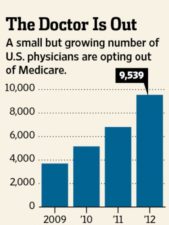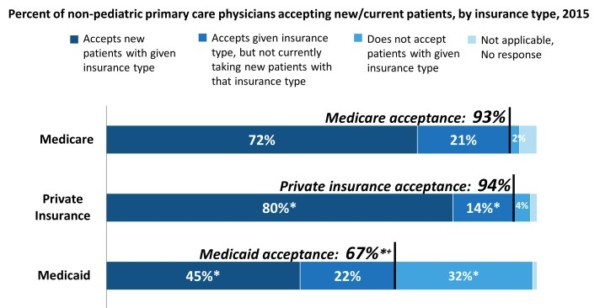 Perhaps the doctor is not in the house. Image: Shutterstock
Perhaps the doctor is not in the house. Image: Shutterstock
As I was in the waiting room of my physician's office today, I overheard a phone call that reminded me of something that I already knew. Chances are, you know it, too. But hearing it in person made the message even more disturbing. It was: Don't get old. Because if you do, good luck finding a doctor who will take Medicare. They are becoming harder to find. And it's virtually impossible to blame them for their decision.
The following is (more or less) the discussion I had with the office manager after the appointment secretary had obviously turned down a Medicare patient who was looking for an appointment with my doctor.
JB: I couldn't help overhearing that conversation. I have written about this in the past. Can I ask you a few questions?
Office Manager: Sure.
JB: Is there any physician in this practice who is taking new Medicare patients?
OM: No. And some of the doctors are phasing out existing patients. We lose money on every Medicare patient that we see.
JB: How often do you get calls like that?
OM: Every day. And, they all ask the same question- whether they can just pay the difference between what Medicare covers and the doctor's fee. Unfortunately, I have to tell them that this is illegal (1).
JB: How much trouble do people like this have finding a physician who will take Medicare patients?
OM: We try to help them find one.
JB: How well does that work?
OM: Not very well.
JB: Is it legal to bypass Medicare entirely, and pay out of pocket so you can see your own doctor?
OM: Yes, it is.
JB: Will the office accept lower payments from people who are in this situation?
OM: We will work with patients on this. We do it all the time.
So, unless you are OK with paying half (?) of the cost of a doctor's fee out of your pocket, there is very little comfort to be found from that conversation. Sure, the shortage of doctors who will accept new Medicare patients isn't anything new, but it feels quite different when you have just heard someone who has just been rejected simply because he or she is 65 or older.
And, it's unlikely to get better. Some say that it will get much worse.
The American Association of Physicians and Surgeons recently published an article entitled "Opting Out of Medicare: a guide for physicians." "It is simple to opt out of Medicare - far simpler than staying in the Medicare program. Thousands of physicians have already opted out, and we have not heard a single regret by any of these physicians. Medicare endangers seniors, rations care and punishes the best doctors whose only aim is to give the best care. For the sake of patients and integrity of the profession, doctors should get out of Medicare."
In 2015, Dr. Rebekah Bernard, the author of a book called "How to Be a Rock Star Doctor," wrote a heartfelt letter to her patients that was featured on the KevinMD website. Bernard, who obviously cares deeply about the people she treats, had this to say:
"We’ve talked about end-of-life issues, and I’ve helped you understand advance directives and DNR forms. I’ve visited you in hospice, and even held your hand as you died."
"For every office visit that we spend together, I spend at least as much time on what Medicare deems as necessary documentation. ... To comply with Medicare requirements, I’ve had to spend thousands of dollars and massive amounts of time instituting electronic health record[s]."
"I wonder if I will be able to afford to care for Medicare patients as a solo physician, not knowing if or when I will be paid, while my expenses remain fixed or increase with inflation."
This trend was well underway by 2009, and began accelerating shortly thereafter:

Physicians who opted out of Medicare, 2009-2012
Source: Centers for Medicare and Medicaid Services
Firm data since 2012 are hard to come by, especially since this issue is highly politicized. But, there is no shortage of indicators that reinforce this trend (2). For example, a 2015 article on the Kaiser Family Foundation website indicates that only 72 percent of physicians are accepting new Medicare patients. For Medicaid, it is far worse:
Source: The Kaiser Family Foundation/Commonwealth Fund 2015 National Survey of Primary Care Providers.
A 2014 article, posted on The Daily Beast website, entitled "How Being a Doctor Became the Most Miserable Profession," will do very little to comfort you. In fact, it will do quite the opposite.
Dr. Daniela Drake, an internal medicine physician in Los Angeles, had this to say. (Keep in mind that this is only the opinion of one physician, and is in no way meant to represent the views of others.)
"By the end of this year, it’s estimated that 300 physicians will commit suicide."
"Simply put, being a doctor has become a miserable and humiliating undertaking."
"Yet physicians have to go along, constantly trying to improve their 'productivity' and patient satisfaction scores — or risk losing their jobs."
"It’s a fact that [in order to get high patient rating scores] doctors acquiesce to patient demands — for narcotics, X-rays,... And now that Medicare payments will be tied to patient satisfaction — this problem will get worse.
There is an organization with the rather foreboding name — the "Drop Out Club (DOC)," which was formed in 1999 when six former classmates from the Columbia College of Physicians and Surgeons got together for drinks. All six had left medicine for various reasons. They chewed it over for a while, and then this happened:
DOC now has more than 30,000 members in 116 countries, and now functions as a crucial resource to provide alternative employment aid to physicians who want out.
There is clearly something going on here, but how much?
Next: Part two — what do the numbers say?
###
Notes:
(1) This applies only to doctors who participate in Medicare. There is a second class called "nonparticipating doctors." They file Medicare reimbursement claims but can only charge up to 10 percent more than Medicare rates, depending the service that is provided. The patient is billed for the difference.
(2) There are also claims, apparently supported by different data, that the idea of the vanishing Medicare doctor is a myth, and is little more than politics and economics. I shall cheerfully "opt out" of this part. I don't discuss politics. Politics is icky.



